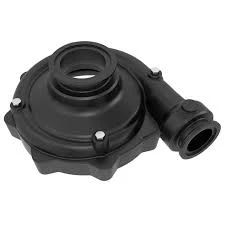Mobile:+86-311-808-126-83
Email:info@ydcastings.com
die cast aluminum material properties
Die Cast Aluminum Material Properties An Overview
Die casting is a manufacturing process that involves forcing molten metal under high pressure into a mold cavity. This technique is widely used for producing complex shapes with high dimensional accuracy and smooth surfaces. Among various materials used in die casting, aluminum is the most popular due to its excellent mechanical properties, lightweight, and resistance to corrosion. Understanding the material properties of die-cast aluminum is crucial for engineers and designers aiming to optimize their products for performance, durability, and cost-effectiveness.
Composition of Die-Cast Aluminum Alloys
Die-cast aluminum is typically composed of aluminum alloyed with elements such as silicon, copper, magnesium, and zinc. The most common aluminum alloy used in die casting is the A380 alloy, which consists of approximately 90% aluminum, 7% silicon, and 3% copper. This specific composition offers a balance of good fluidity, high strength, and excellent corrosion resistance. Other alloys, such as A383 and A384, are also popular and may be used depending on the application's specific requirements.
Mechanical Properties
One of the primary advantages of die-cast aluminum is its mechanical properties. Die-cast aluminum exhibits notable strength and stiffness, making it suitable for a variety of load-bearing applications. The tensile strength of die-cast aluminum alloys typically ranges from 70 to 300 MPa, while the yield strength can vary from 40 to 250 MPa depending on the specific alloy and heat treatment processes involved.
The fatigue strength of aluminum, particularly die-cast components, is also commendable. Fatigue strength helps to predict a material's performance under cyclic loading, which is vital for components that experience repeated stress during their service life. For die-cast aluminum, the fatigue strength can be around 50-130 MPa.
Thermal Properties
Die-cast aluminum exhibits excellent thermal conductivity, which is beneficial in applications where heat dissipation is essential, such as in automotive or electronic components. The thermal conductivity of die-cast aluminum typically ranges from 150 to 200 W/m·K. This property allows for efficient heat transfer away from heat-generating components, enhancing reliability and performance.
Moreover, aluminum has a relatively low thermal expansion coefficient compared to other metals, meaning it retains its dimensional stability even with temperature fluctuations
. This is particularly important in precision applications where tight tolerances are critical.die cast aluminum material properties

Corrosion Resistance
One of the standout characteristics of die-cast aluminum alloys is their corrosion resistance. Aluminum naturally forms a thin oxide layer on its surface when exposed to air, which acts as a protective barrier against further oxidation and deterioration. This property is highly advantageous for components used in harsh environments.
However, the effectiveness of this oxide layer can vary based on the specific alloy composition and the presence of alloying elements. For example, alloys with higher silicon content generally exhibit better corrosion resistance. Additionally, surface treatments such as anodizing can further enhance the corrosion resistance of aluminum die-casts, making them suitable for outdoor applications and marine environments.
Machinability and Finish
Die-cast aluminum is known for its good machinability, which allows for easy fabrication and finishing. It can be readily machined to tight tolerances, and a variety of surface finishes such as painting, anodizing, or powder coating can be applied to improve aesthetics and further enhance corrosion resistance.
Cost-Effectiveness
When it comes to production, die-cast aluminum is often favored for its cost-effectiveness. The high-speed production rates of die casting reduce manufacturing time and labor costs, making it an economical choice for high-volume applications. While the initial cost of aluminum materials may be higher than that of some other metals, the benefits, combined with long service life and lower maintenance costs, often justify the investment.
Conclusion
In summary, die-cast aluminum offers a unique blend of properties that make it one of the most versatile materials in the manufacturing sector. With its mechanical strength, excellent thermal properties, resistance to corrosion, and cost-effectiveness, die-cast aluminum components continue to gain popularity across various industries, from automotive to aerospace. Understanding the material properties of die-cast aluminum is essential for optimizing designs and ensuring product performance, thereby enabling engineers to leverage its numerous advantages in innovative and effective ways.
-
Understanding Metal Casting TechniquesNewsApr.02,2025
-
Understanding Exhaust Manifolds for Enhanced Engine PerformanceNewsApr.02,2025
-
The World of Metal FabricationNewsApr.02,2025
-
Key Components for Pump and Turbo EfficiencyNewsApr.02,2025
-
Essential Tools for Automotive Maintenance and RepairNewsApr.02,2025
-
Durable Valve Components for Effective Water ManagementNewsApr.02,2025











